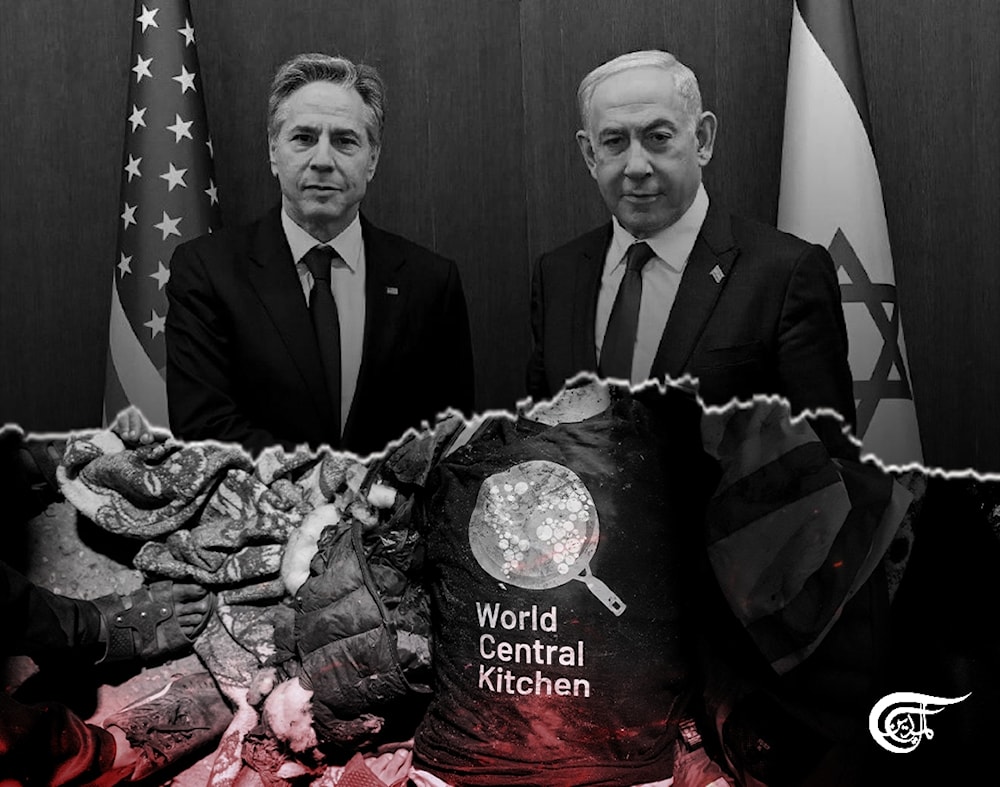Understanding Washington’s Dirty Game Of Toying With Gaza Aid And Ceasefire
Even when it came to the shift in the rhetoric of American policy makers, to begin calling for a “ceasefire”, they did not “shift” their policy position in any way at all.
-

The language change and by blaming Netanyahu for all the problems at hand, the US government has made the calculation that they can give the impression of an administration that is standing up to the Israeli regime (Illustrated by Batoul Chamas to Al Mayadeen English)
The US government can end the war in Gaza if it chooses and with a single phone call allow all the humanitarian aid that will prevent famine from gripping the starving Palestinian population living there. Instead, Washington has opted to play a dirty game of teasing the delivery of aid, leaking stories of tensions and an imminent ceasefire to the press, while only seeking to buy more time for the Zionists to carry out their ongoing genocide.
On November 10, last year, US Secretary of State, Antony Blinken, issued a statement in which he stressed that "Far too many Palestinians have been killed. Far too many who have suffered these past weeks, and we want to do everything possible to prevent harm to them and to maximize the assistance that gets to them," as he praised the temporary pause reached between the Palestinian resistance and the Zionist Entity. Following the end of the pause and prisoner swap, Blinken again appeared on the scene inside occupied Palestine. This time, giving the impression that the US government would force an end to the war, by the beginning of the New Year.
Then, on January 9, after failing to stop the Israeli onslaught in Gaza, the US Secretary of State issued another speech, this time from inside the Zionist Entity, declaring again that the Palestinian death toll was “far too high”. Both in November and January, these declarations by Antony Blinken, were widely interpreted to have been critical of the Israelis and indicated some level of frustration, or rhetoric change, when it comes to their Zionist allies.
When we also look at US President, Joe Biden, we have heard for months about the “frustration” of the American leader with his Israeli counterpart, Benjamin Netanyahu. Reports have frequently been leaked to US media regarding unconfirmed events, which include Joe Biden hanging up a phone call with the Israeli Prime Minister in mid-January and the allegation that the US President called Netanyahu a “bad f***ing guy” in February. Events like the Israeli war cabinet member, Benny Gantz, traveling to Washington, allegedly without Netanyahu knowing, have also been held up as examples of the US-Israeli “strained relationship”.
Joe Biden said in late February that it looks like there'll be a ceasefire the next Monday, causing false hope in the Gaza Strip at the time. Then, Axios News released an article in which they made the claim that the US government was going to cut off arms supplies to the Zionist regime if they did not reach a temporary ceasefire in Gaza by mid-March. Then at the end of March, after having failed to place any pressure on the Israeli regime to even deliver sufficient food aid into Gaza, the Biden administration decided to quietly approve a multi-billion dollar weapons and fighter jet supply deal.
Another important point to note is the way the US government reacted to the Israeli threat to invade the southernmost city of Gaza, Rafah, claiming to set it as a hypothetical redline. Although the Biden administration would ultimately come forth and affirm that it would support an invasion of Rafah and wouldn’t set any red lines, the idea that Washington was holding the Zionist regime back from the invasion it had threatened - over the period of two months - was heavily pushed throughout Western media.
Then there is the US abstention from the United Nations Security Council (UNSC) resolution, that called for a two-week ceasefire. Again, the reaction to this was to interpret it as a “change”, or “shift”, in the US position on the war in Gaza, yet, when pressed on the issue the Biden administration claimed that the Security Council resolution - all of which are considered binding - was in fact the first UNSC resolution ever to be non-binding.
Even when it came to the shift in the rhetoric of American policy makers, to begin calling for a “ceasefire”, they did not “shift” their policy position in any way at all. In fact, they just shifted from using words like “temporary truce” and “pause”, to asking for a “six-week ceasefire”, so, in other words, a temporary truce or pause still. Then, when confronted with growing calls from the United Nations and the World Bank, regarding the issue of looming famine that is set to take hold over roughly half of Gaza’s population, the Biden administration began announcing its intention to build a port to transport aid. The details of such a port's construction are still unclear and whether it will ever be implemented for the purpose of delivering vital aid or not is an open question.
It is high time that we call the US Biden administration out on its dirty games. Washington is in control of this war and has made the active decision to allow mass starvation in Gaza, clearly an Israeli tactic of war, it is only buying time for this policy of inflicting famine to take place. It is evident that the Zionist entity has no plan to dismantle Hamas in Gaza, in fact, it hasn’t even been able to dismantle any of the smaller groups belonging to the Palestinian resistance front in the besieged territory. So, instead, it inflicted the worst possible humanitarian crisis, a famine, along with the assassination of all security figures, members of popular committees set up locally to guard, collect and distribute aid, while attempting to make it impossible for the former civil administration to continue working in a post-war Gaza. This is also why the US has implemented a ban on funding the United Nations Relief and Works Agency (UNRWA).
Why is the US playing this dirty game you may ask? There are two primary reasons: To quell domestic pressure to end the war and to deceive the axis of resistance into thinking that they are on the cusp of reaching a ceasefire. The language change and by blaming Netanyahu for all the problems at hand, the US government has made the calculation that they can give the impression of an administration that is standing up to the Israeli regime. On the other hand, the US fears a regional war, which could explode in the event that no ceasefire is reached in Gaza, so they give the impression that there is some kind of in-fighting between them and the Zionist leadership. This is all theater and the US must be forced into a position where it is given an ultimatum: either you force an end to this war in Gaza, or there is a major escalation in the region. Nobody wants regional war, but regional war is inevitable if there is no ceasefire reached and the people of Gaza are gripped by one of the worst famines in recorded history.

 Robert Inlakesh
Robert Inlakesh
 7 Min Read
7 Min Read











